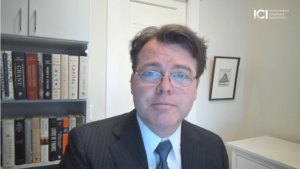Fund-industry executives and trustees attending the Investment Company Institute’s (ICI) annual flagship conference didn’t talk much after the speech about anything William Birdthistle said.
They did talk about what he didn’t say, however.
Birdthistle, the SEC official most responsible for proposing the swing-pricing rule that inspired an unprecedented level of opposition from the fund industry, spoke to leaders of that industry for 30 minutes about the SEC’s regulatory priorities without mentioning swing pricing or the liquidity risk assessment goals it was introduced to support.
Opposition to the swing-pricing proposal is so widespread and intense that more than 30 fund boards, which rarely speak out publicly for or against SEC regulations, filed often-detailed public comments opposing the rule proposal in conjunction with a broad-based opposition movement coordinated by fund complexes and industry associations, including the ICI, which hosted the speech by William Birdthistle, director of the Division of Investment Management (DIM) March 20 at its Investment Management Conference In Palm Desert, Calif.

ICI responded to the widespread anxiety about regulations – and about the swing-pricing proposal in particular – by narrowing the usual list of broad management topics to focus the conference on topics designed to help fund advisers and boards figure out how to keep up with the enormous volume of regulatory changes proposed by the SEC. While swing pricing was not the focus of every session, speakers and panel members dove into a discussion of it during sessions that touched on it and brought it up as an example of future trouble when it was not on the agenda.
Rather than court controversy – as he did during his speech at the 2022 ICI conference by suggesting the failure of shareholders to win any lawsuits over allegedly excessive fees could mean that funds and fund boards were getting away with charging high fees – Birdthistle attempted to explain the overarching concerns that inspired many of the SEC’s rule proposals and categorize some of the more controversial rules by saying which overarching concern they are intended to address.
Three major trends drive the bulk of the SEC’s rulemaking, he said: the pace and pattern of technological innovation, demographic changes caused primarily by aging populations and generational change and the growth and product diversity of the markets the SEC regulates.
Technological advancements, the first major uber-source of change, produce risks the SEC addressed by introducing cybersecurity rules designed to set an acceptable minimum standard to protect customer information, he said.
Demographic changes drive many more regulatory efforts, he said, as the SEC attempts to compensate for impending changes such as the mass retirement of the Baby Boom generation. As Baby Boomers retire, the opinions and proclivities of younger investors become more of a factor. Those changes have led to growth in sustainable investing and non-traditional trading platforms, which prompted the SEC to respond with tighter controls on ESG investment strategies, naming and marketing, more expansive fund-disclosure requirements and an increasing focus on diversity and equity issues within the fund industry and the operating companies in which it invests.
The third mega-trend, rapid market growth, is also driven by major social trends such as the increasing shift away from defined-benefit pension plans and toward more individual control over investing, which has driven expansion in the number and types of funds available and increased demand for more sophisticated products and services, pushing fund complexes to look for ways to automate parts of the process and outsource others to third parties, he said. Those developments are ultimately behind the SEC’s effort to impose greater responsibility for approving and oversight on advisers – as a way to make sure investors know when third parties are involved and see what potential exists for conflicts of interest that might work against their interests, he said.
Speaking on the same stage a few hours later, SEC Commissioner Mark Uyeda attacked decision-makers driving the SEC’s rulemaking machine for trying to make big changes in real markets based more on how regulators think markets should work rather than how they do.
“The SEC has been focused on rulemakings based on unrealistic expectations of how the world functions and how it ought to be,” Uyeda said.
Uyeda didn’t mention any SEC official by name and did not refer to any of what Birdthistle had said, but did deride what he described as the commission’s overly academic approach as “regulation by theory and hypothesis.”
ICI CEO Eric Pan also slammed the SEC’s rulemaking as overly aggressive, overly prescriptive and unrealistic about the value of eliminating all risk from an investment market built on the idea that positive returns come from the management of risk, not its elimination.
Both said they support appropriate regulation of investment markets but oppose the underlying approach and relentless pace of regulatory change.
